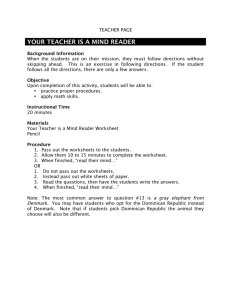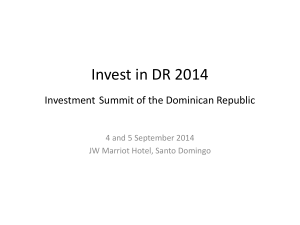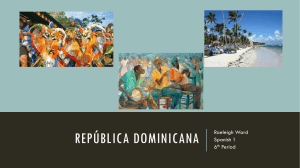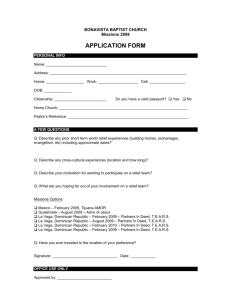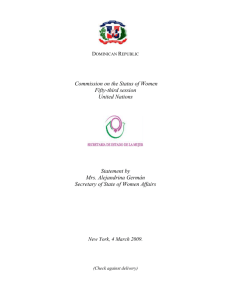DOMINICAN REPUBLIC
advertisement
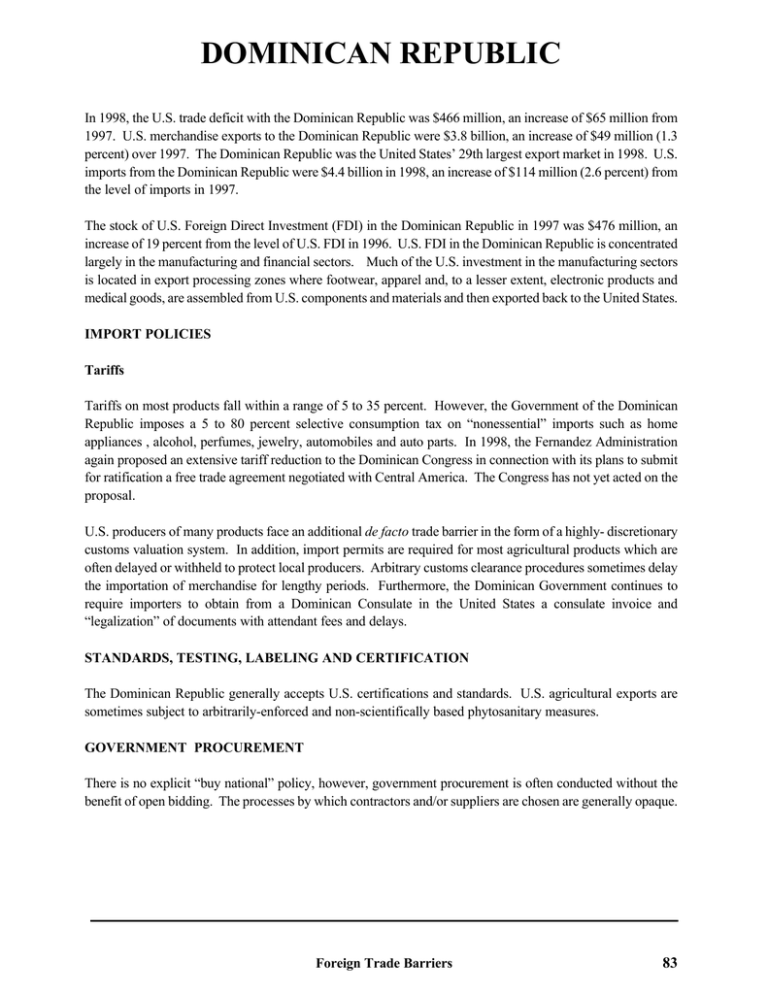
DOMINICAN REPUBLIC In 1998, the U.S. trade deficit with the Dominican Republic was $466 million, an increase of $65 million from 1997. U.S. merchandise exports to the Dominican Republic were $3.8 billion, an increase of $49 million (1.3 percent) over 1997. The Dominican Republic was the United States’ 29th largest export market in 1998. U.S. imports from the Dominican Republic were $4.4 billion in 1998, an increase of $114 million (2.6 percent) from the level of imports in 1997. The stock of U.S. Foreign Direct Investment (FDI) in the Dominican Republic in 1997 was $476 million, an increase of 19 percent from the level of U.S. FDI in 1996. U.S. FDI in the Dominican Republic is concentrated largely in the manufacturing and financial sectors. Much of the U.S. investment in the manufacturing sectors is located in export processing zones where footwear, apparel and, to a lesser extent, electronic products and medical goods, are assembled from U.S. components and materials and then exported back to the United States. IMPORT POLICIES Tariffs Tariffs on most products fall within a range of 5 to 35 percent. However, the Government of the Dominican Republic imposes a 5 to 80 percent selective consumption tax on “nonessential” imports such as home appliances , alcohol, perfumes, jewelry, automobiles and auto parts. In 1998, the Fernandez Administration again proposed an extensive tariff reduction to the Dominican Congress in connection with its plans to submit for ratification a free trade agreement negotiated with Central America. The Congress has not yet acted on the proposal. U.S. producers of many products face an additional de facto trade barrier in the form of a highly- discretionary customs valuation system. In addition, import permits are required for most agricultural products which are often delayed or withheld to protect local producers. Arbitrary customs clearance procedures sometimes delay the importation of merchandise for lengthy periods. Furthermore, the Dominican Government continues to require importers to obtain from a Dominican Consulate in the United States a consulate invoice and “legalization” of documents with attendant fees and delays. STANDARDS, TESTING, LABELING AND CERTIFICATION The Dominican Republic generally accepts U.S. certifications and standards. U.S. agricultural exports are sometimes subject to arbitrarily-enforced and non-scientifically based phytosanitary measures. GOVERNMENT PROCUREMENT There is no explicit “buy national” policy, however, government procurement is often conducted without the benefit of open bidding. The processes by which contractors and/or suppliers are chosen are generally opaque. Foreign Trade Barriers 83 Dominican Republic EXPORT SUBSIDIES The Dominican Republic does not have aggressive export-promotion schemes other than the exemptions given to firms in the free trade zones. A tax rebate scheme designed to encourage exports is considered a failure and is usually avoided by exporters. LACK OF INTELLECTUAL PROPERTY PROTECTION Dominican law does not provide adequate and effective protection of intellectual property rights including levels of protection that are consistent with international standards such as the WTO Agreement on Trade-Related Aspects of Intellectual Property Rights (TRIPS). For example, the copyright law is deficient in a number of areas. The Dominican Republic has inadequate patent protection, especially for pharmaceuticals. The Dominican Republic was upgraded to the USTR Special 301 Priority Watch List in 1998 due to continuing concerns about lack of TRIPS-consistent laws, and inadequate enforcement against piracy and counterfeiting, particularly of pharmaceutical products. PhARMA currently assesses that the economic losses to U.S. industry in the Dominican market in pharmaceutical products alone are in excess of $50 million. A report prepared by the International Intellectual Property Alliance (IIPA) estimates that copyright infringements in the Dominican Republic cost U.S. firms $3.0 million in 1998. Copyrights The piracy of computer software, video and audio tapes, and compact disk technologies, as well as TV piracy continues although the Dominican copyright office has been more active in the past year in seeking to enforce the law. A U.S. government review of the Dominican Republic’s trade preferences under the generalized system of preferences (GSP), in response to a petition from the Motion Picture Export Association of America claiming widespread cable television piracy, was terminated in 1994 when the Dominican Government took steps to address U.S. concerns. Larger cable television companies now generally pay fees and royalties, although smaller systems may still be pirating signals and programs. The MPA and Television Association of Programmers (TAP) visited the Dominican Republic again in 1997 to raise this recurring problem. The Dominican Government has taken some steps in response, although such initiatives have not been enough to stem the problem. Patents The existing 1911 Law provides for broad exclusions of subject matter from patentability, and include onerous local working requirements. Current law is also inadequate with respect to term of protection. The Fernandez Government has submitted new intellectual property legislation to the Congress as part of a broader commercial code. As now written, this legislation will contravene several TRIPS provisions, such as those pertaining to compulsory licenses. The Ministry of Health is still granting marketing approvals for pharmaceutical products that infringe existing patent rights. Trademarks Trademark enforcement is inadequate, particularly in the area of well-known apparel and athletic shoe brands, which are counterfeited and sold widely on the local market. 84 Foreign Trade Barriers Dominican Republic SERVICES BARRIERS Until recently, foreign participation in the Financial Services Sector was restricted by law. The 1995 Foreign Investment Law, and a Financial-Monetary Code still before the Dominican Congress, permit foreign involvement in the Financial Services Sector. However, the practical impact of these provisions is not clear. There is no secondary securities market in the Dominican Republic so questions of brokerage services and securities underwriting, trading, etc., do not arise. The Dominican Republic is overdue in providing to the WTO an acceptance of the Fifth Protocol to the General Agreement on Trade in Services, which is necessary to bring its commitments on financial services into effect. ELECTRONIC COMMERCE There are no known tariff or non-tariff measures, burdensome or discriminatory regulations, or discriminatory taxation affecting electronic commerce. Foreign Trade Barriers 85 Dominican Republic 86 Foreign Trade Barriers
